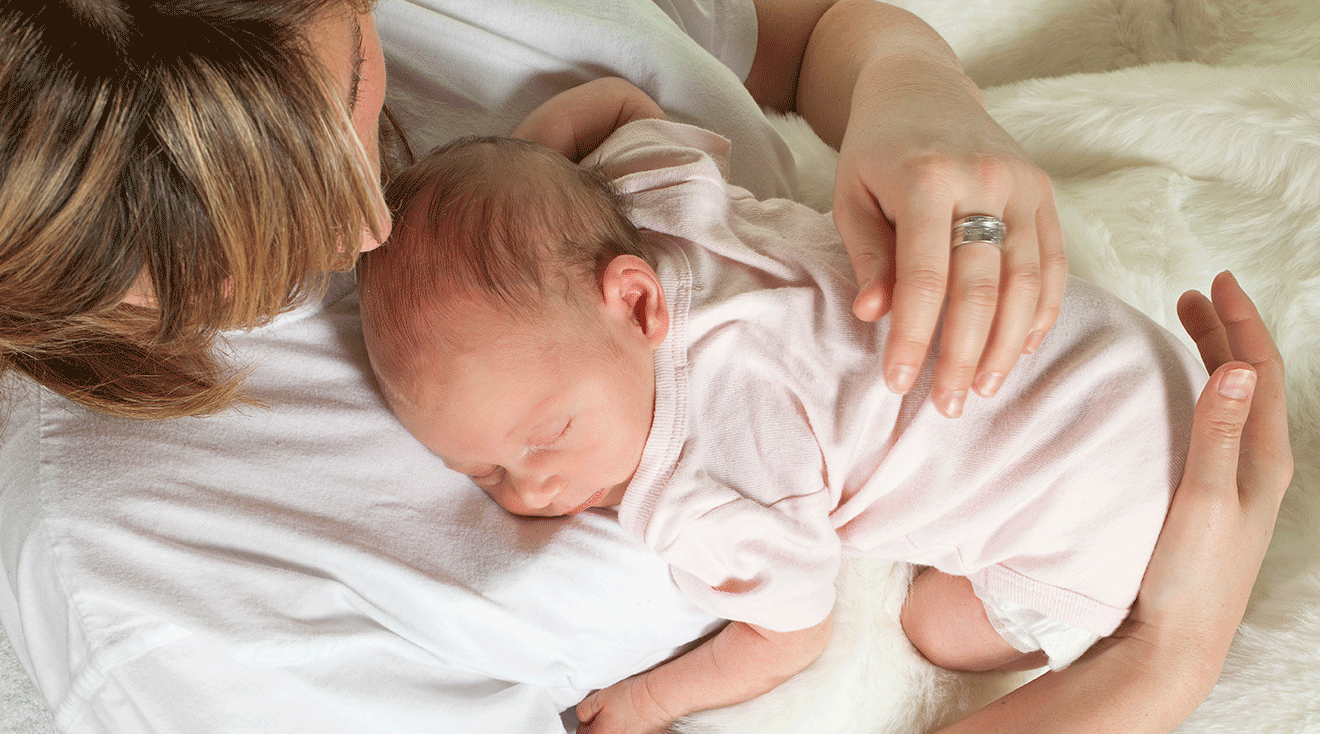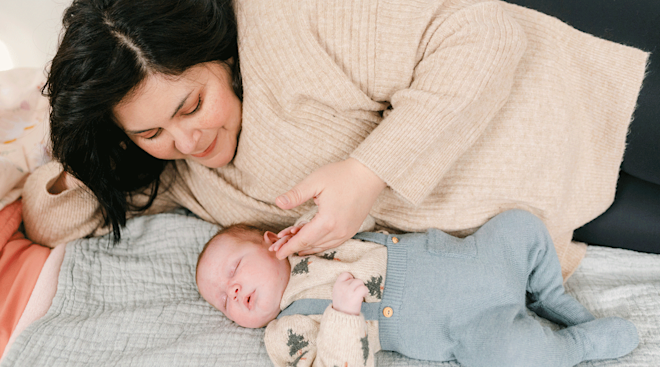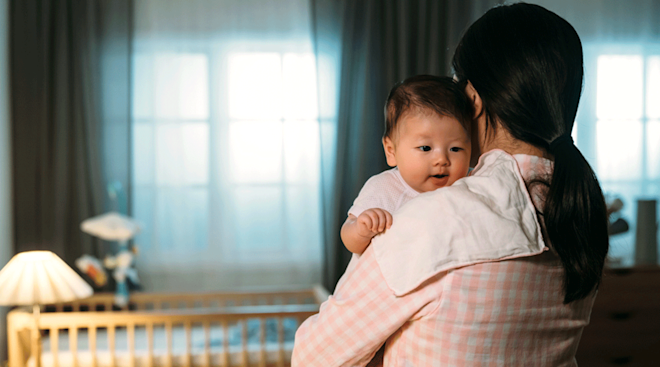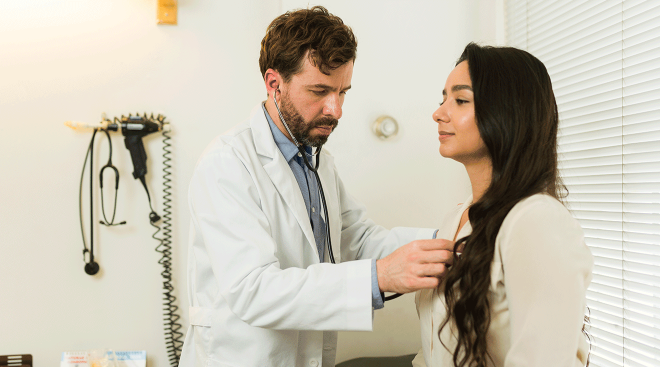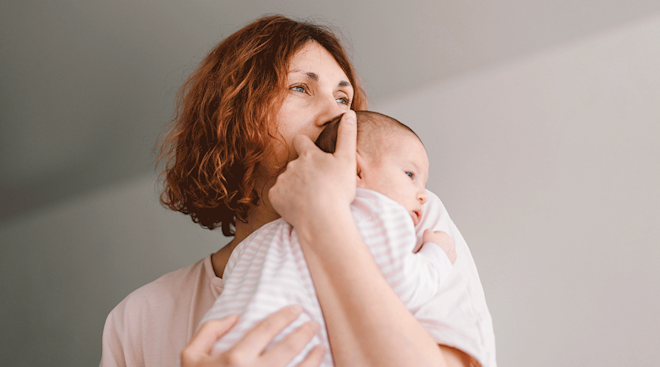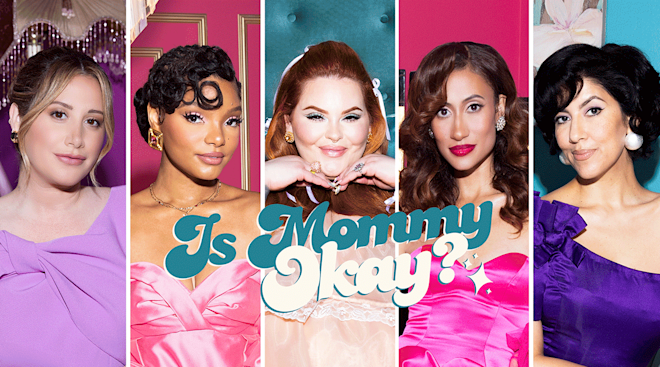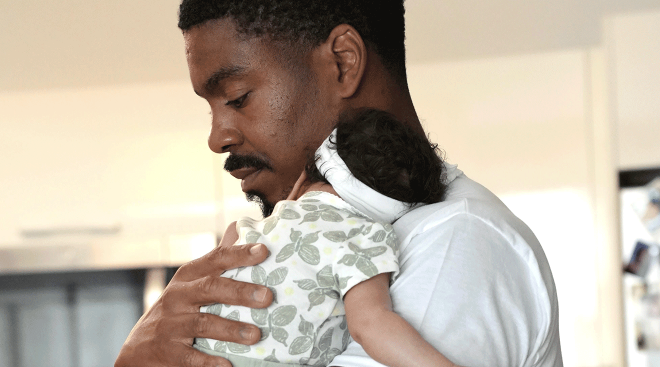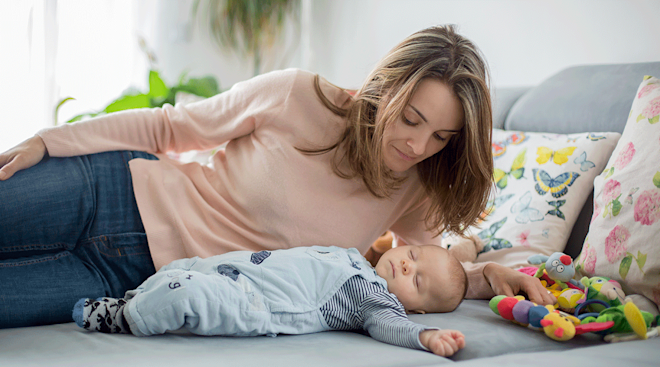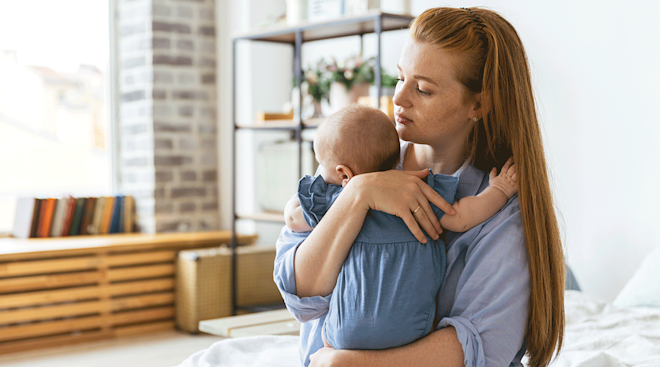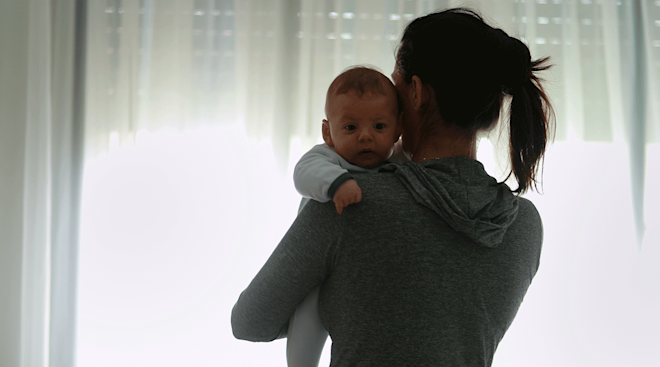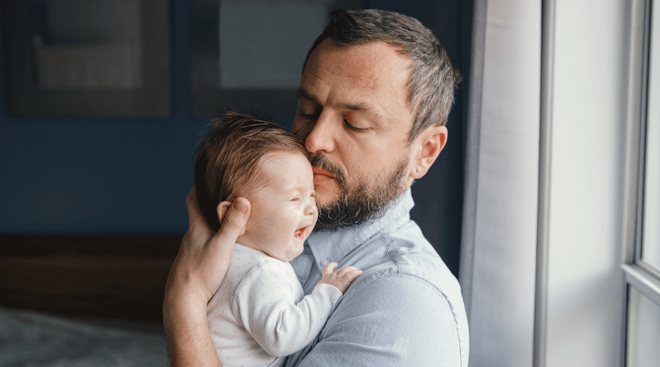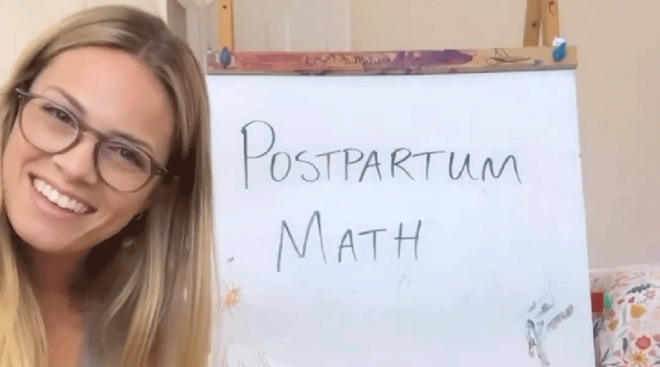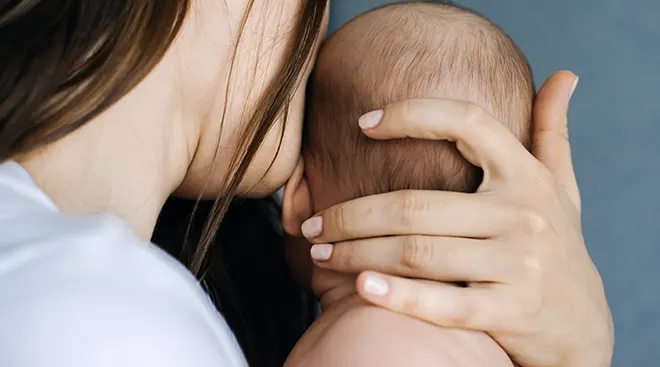What You Need to Know About Postpartum OCD
It’s very common to feel anxious about baby’s well-being if you’re a new parent: After all, you’re embarking on a new era in your life and you’re not always quite sure what you’re doing. But if your worries turn into intrusive thoughts and compulsions—aka repetitive behaviors—you might be experiencing postpartum obsessive compulsive disorder, or postpartum OCD. It’s important to reach out to a mental health professional if you think you have postpartum OCD symptoms. In the meantime, read on for what you need to know about this condition, including how to find treatment.
Postpartum OCD is when a new parent has “obsessive, intrusive, repetitive thoughts or mental images [often] regarding the well-being of baby” that cause significant distress, explains Renée Goff, PsyD, PMH-C, a licensed clinical psychologist and owner of Orchid Wellness & Mentoring in Cincinnati, Ohio. To counteract the obsessive thoughts, you might develop compulsions, aka repetitive behaviors and/or thoughts, she says.
Postpartum OCD differs from postpartum anxiety: “Postpartum anxiety is more about the ‘what ifs’ or events that could happen, whereas postpartum OCD [is characterized by] intrusive, irrational thoughts,” says Goff. “The person with OCD is often aware that the thoughts and compulsions are irrational, but still [feels] a strong, necessary urge to complete the compulsion or ritual.” The condition is also different from postpartum depression, which is defined as “an overwhelming feeling of sadness, depressed mood and/or irritability,” she adds. (The International OCD Foundation (IOCDF) notes that postpartum OCD and postpartum depression can go hand-in-hand.)
While reported statistics vary, according to the Anxiety and Depression Association of America, about 3 to 5 percent of new moms experience perinatal OCD, which is defined as OCD that occurs either postpartum or during pregnancy.
Postpartum OCD is thought to be related to the hormonal and psychological changes that happen during the pregnancy and postpartum period, says Sherry Ross, MD, women’s sexual health expert and author of She-ology and She-ology, the She-quel. She adds that if you’re a first-time mom or have a history of postpartum depression, you could be at risk of developing postpartum OCD.
For many adults who experience OCD in general, the onset of symptoms occurs in their late teens or early 20s, notes Jason Gibbs, PhD, a licensed therapist at NOCD, an online therapy service and app that provides treatment for people with OCD and related conditions. He adds that OCD is also known to occur during stressful life events—and pregnancy certainly qualifies as one.
The main symptoms of postpartum OCD are very similar to the symptoms of standard OCD, says Gibbs. However, the obsessive thoughts and compulsions typically center around baby. “Obsessive thoughts or images can consist of fear of contaminating or dropping the baby,” says Goff. “Compulsions can consist of excessive hand-washing or bottle-washing or sterilizing, counting items and checking on baby.”
Checking on baby can include, for example, having to count a certain number of breaths baby takes while they sleep. As a first-time mom, I myself remember hooking baby up to a breathing band and making sure I’ve watched him breathe for a specific number of minutes and breaths before I could drift off to sleep myself. While I don’t think I developed true postpartum OCD—though I definitely had postpartum anxiety—I now recognize that these behaviors veered close to the symptoms described by the experts.
The IOCDF notes that along with fear of harming baby, postpartum OCD can look like:
- Compulsions that are meant to control or stop the obsessive thoughts, or to prevent your fears from coming true: for example, checking on baby or asking for reassurance
- Avoiding certain activities with baby, like bathing or using stairs
- Feeling overwhelmed by the obsessions and compulsions
- Feeling depressed, as postpartum OCD and postpartum depression can occur together
- Trouble sleeping due to the postpartum OCD intrusive thoughts
Goff adds that although it’s uncomfortable to talk about, obsessive thoughts can also be sexual: “One may have intrusive thoughts that they may harm their baby sexually or that they may become aroused from breastfeeding, for example,” she says. “It’s important to note that these obsessive thoughts are extremely distressing for the person as they have no desire or intention for these things to happen.”
Postpartum OCD is diagnosed just as OCD would be diagnosed: by a mental health professional, such as a therapist or psychiatrist, says Gibbs. Because OCD is often misdiagnosed, he says meeting with a licensed provider who specializes in OCD is particularly helpful in order to get an accurate diagnosis.
Goff adds that in order to receive a diagnosis, the postpartum OCD symptoms “must be causing distress and impairing the person’s ability to function daily for at least two weeks consistently. The obsessions and compulsions must also be time-consuming, causing disruption to the person’s day [and] functioning.”
Postpartum OCD treatment commonly consists of therapy and/or medication, say experts.
Therapy for postpartum OCD
The first line of treatment for postpartum OCD is Exposure and Response Prevention (ERP), says Gibbs. ERP for postpartum OCD is a “form of therapy that involves gradual exposure to feared outcomes associated with OCD in order to reduce an individual’s response to their fears,” he says. ERP is a type of cognitive-behavioral therapy (CBT).
Postpartum OCD medication
Gibbs notes that selective serotonin reuptake inhibitors (SSRIs) and Clomipramine can also be used to provide symptom relief.
“Postpartum OCD is a lot like non-postpartum OCD in that it often becomes exacerbated without treatment,” explains Gibbs. “While this isn’t always the case, and some people do experience symptom remission without treatment, OCD symptoms often grow in frequency and severity over time, making treatment important.”
However, with the right treatment, postpartum OCD symptoms can improve over time, says Ross. “The timeline for recovery will vary on each person depending on how quickly help is found and treatment begins to improve the disruptive behaviors,” she says. “Early intervention will speed up the timeline for recovery.”
Frequently Asked Questions
Is there a postpartum OCD test?
While you might be able to find various tests online, “there are currently no well-validated and researched measurements for postpartum OCD that are widely used by clinicians,” says Gibbs. Licensed professionals use standard OCD assessments such as the Yale-Brown Obsessive Compulsive Scale (Y-BOCS) and the Dimensional Obsessive Compulsive Scale (DOCS), he adds.
Can postpartum OCD turn into psychosis?
Sometimes, postpartum OCD is confused with postpartum psychosis because both can involve thoughts about harming baby, says IOCDF. However, in postpartum psychosis—an extremely rare condition affecting 0.1 percent of new moms—a person might develop hallucinations, and, in extreme cases, actually act on them. “Whereas a person with postpartum psychosis believes his or her hallucinations and delusions are true, [postpartum OCD] sufferers are afraid of their obsessions and recognize that these thoughts and ideas are inconsistent with their world view,” says IOCDF. There’s also no evidence that postpartum OCD could turn into postpartum psychosis.
How can I find postpartum OCD help?
The first step to finding help for postpartum OCD is identifying that there’s a problem, says Gibbs. After this, you’ll want to find a provider who can accurately diagnose you. “Given the unique nature of OCD, and the unfortunate fact that not many providers are very well-versed in the condition, we recommend seeking out a clinician who’s trained in the utilization of ERP for OCD, as they’ll have the most experience with identifying, diagnosing and effectively treating this condition,” he says.
Does postpartum OCD go away?
Again, with the right treatment, the condition can improve over time. But it likely won’t go away unless you seek help. “If you’re experiencing clinically significant symptoms, it won't likely go away on its own and should be treated, as the compulsions, especially, can be extremely rigid and hard to break,” says Goff.
Postpartum OCD can be a challenging condition, but with the guidance of an experienced mental health professional, you can experience relief from your symptoms—and be on the road to postpartum OCD recovery.
Please note: The Bump and the materials and information it contains are not intended to, and do not constitute, medical or other health advice or diagnosis and should not be used as such. You should always consult with a qualified physician or health professional about your specific circumstances.
Plus, more from The Bump:
Jason Gibbs, PhD, is a licensed therapist at NOCD, an online therapy service and app that provides treatment for people with OCD and related conditions.
Renée Goff, PsyD, PMH-C, is a licensed clinical psychologist and owner of Orchid Wellness & Mentoring in Cincinnati, Ohio. She received her doctor of psychology from Wright State University in Dayton, Ohio.
Sherry Ross, MD, is an ob-gyn and women’s sexual health expert. She’s the author of She-ology: The Definitive Guide to Women’s Intimate Health. Period. and She-ology, the She-quel: Let's Continue the Conversation. She received her medical degree from New York Medical College.
Anxiety and Depression Association of America, Understanding Postpartum OCD and the Mother/Baby Attachment, May 2023
International OCD Foundation, What Are Postpartum and Perinatal OCD?
International OCD Foundation, Exposure and Response Prevention (ERP)
StatPearls, Clomipramine, December 2022
Learn how we ensure the accuracy of our content through our editorial and medical review process.
Navigate forward to interact with the calendar and select a date. Press the question mark key to get the keyboard shortcuts for changing dates.
































